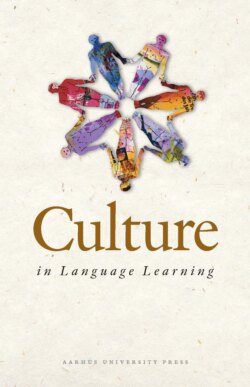Читать книгу Culture in Language Learning - Группа авторов - Страница 19
На сайте Литреса книга снята с продажи.
BIBLIOGRAPHY
ОглавлениеAtkinson, D. 1999. ‘TESOL and culture’. TESOL Quarterly, 33(4), 625-65.
Bausch, K.R., Herbert C. & H.-J. Krumm (eds.), 1994. Interkulturelles Lernen im Fremdsprachenunterricht. Tübingen: Narr.
Busch, B. 2004. Sprachen im Disput. Medien und Offentlichkeit in multilingualen a Gesellschaften. Klagenfurt: Drava.
Byram, M. & M. Fleming 1998. Language Learning in Intercultural Perspective. Cambridge: Cambridge University Press.
Cameron, D. 2000. Good to talk? Living and working in a communication culture. London: Sage.
Edmondson, W. & J. House 1998. ‘Interkulturelles Lernen: ein überflüssiger Begriff’. Zeitschrift für Fremdsprachenlernen, 9(2), 161-188.
Fill, A. & P. Mühlhäusler (eds.) 2001. The ecolinguistics reader. London: Continuum.
Gee, J. 1990. Social Linguistics and Literacies. Ideology in Discourses. New York: The Falmer Press.
Hanks, W. 2000. Intertexts. Writings on Language, utterance, and context. New York: Rowman & Littlefield.
Hansen, H.L. 2004a. ‘Towards a new philology of culture’. In Jensen, J.H.C. (ed.) The Object of Study in the Humanities. Copenhagen: Museum Tusculanum Press, 113-126.
Hansen, H.L. 2004b. ‘Foreign Language Studies and Interdisciplinarity’. In Hans L. Hansen (ed.), Disciplines and Interdisciplinarity in Foreign Language Studies. Copenhagen: Museum Tusculanum Press, 7-20.
Hinton, L. 1994. Flutes of Fire. Essays on California Indian languages. Berkeley, CA: Heyday books.
Holliday, A. 1999. ‘Small cultures’. Applied Linguistics, 20(2), 237-64.
Hu, A. 1999. ‘Interkulturelles Lernen. Eine Auseinandersetzung mit der Kritik an einem umstrittenen Konzept’. Zeitschrift für Fremdsprachenlernen, 10(2), 277-303.
Königs, F. 2003. ‘Teaching and learning foreign languages in Germany’. Language Teaching. October, 235-251.
Kramsch, C. 1993. Context and culture in language teaching. Oxford: Oxford University Press.
Kramsch, C. 1998. Language and culture. Oxford: Oxford University Press.
Kramsch, C. 2001. ‘Intercultural communication’. In: R. Carter & D. Nunan (eds.). The Cambridge Guide to TESOL. Cambridge: Cambridge University Press, 201-206.
Kramsch, C. 2002. ‘Language and culture: A social semiotic perspective’. ADFL Bulletin, 33(2), 8-15.
Kramsch, C. 2004. ‘Language, Thought and Culture’. In: A. Davies & C. Elder (eds.), The Handbook of Applied Linguistics. Oxford: Blackwell, 235-61.
Luke, A. 1996. ‘Genres of power? Literacy education and production of capital’. In: R. Hasan & G. Williams (eds.), Literacy in Society. London: Longman, 308-38.
Moermann, M. 1988. Talking Culture. Ethnography and conversation analysis. Philadelphia: University of Pennsylvania Press.
Norton, B. 1997. ‘Language, identity and the ownership of English’. TESOL Quarterly, 31(3), 409-30.
Pavlenko, A. & Lantolf, J. 2000. ‘Second language learning as participation and the (re)construction of selves’. In: J. Lantolf (ed.), Sociocultural theory and second language learning. Oxford: Oxford University Press, 155-178.
Peyton, J.K., D.A. Ranard, & S. McGinnis (eds.) 2001. Heritage Languages in America: Preserving a national resource. McHenry, IL: The Center for Applied Linguistics and Delta Systems.
Rampton, B. 1995. Crossing. Language and Ethnicity among Adolescents. London: Longman.
Seidlhofer, B. 2003. ‘Closing a conceptual gap: the case for a description of English as a lingua franca’. International Journal of Applied Linguistics, 11(2), 133-158.
Taylor, C. 1994. Multiculturalism. Examining the politics of recognition. Princeton, NJ: Princeton University Press.
Warschauer, M. & R. Kern (eds.) 2000. Network-based Language Teaching: Concepts and practice. Cambridge: Cambridge University Press.
Zarate, G. (ed.) 2004. Cultural mediation in language learning and teaching. Strasbourg: Council of Europe.
